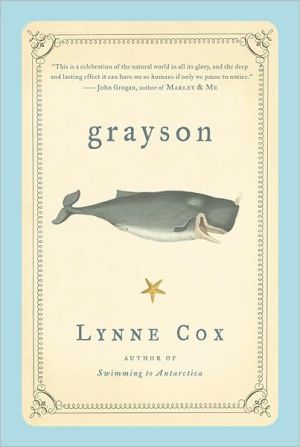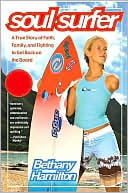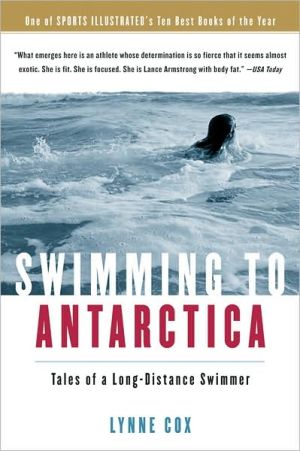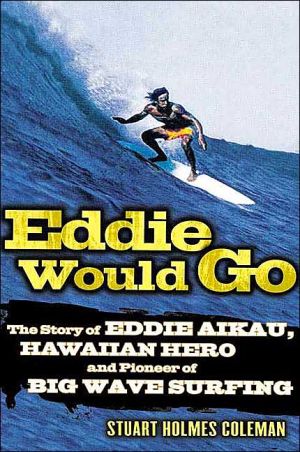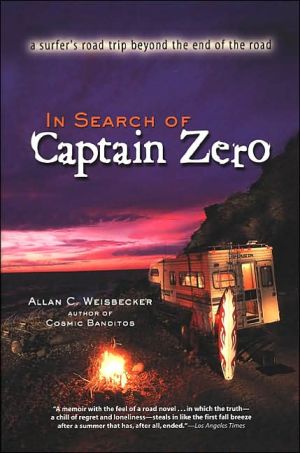Grayson
The true story of a miraculous encounter between a teenaged girl and a baby whale off the coast of California\ It was the dark of early morning; seventeen-year-old Lynne Cox was swimming her last half mile back to the pier after a long workout when she became aware that something was swimming with her. The ocean was charged with energy as if a squall was moving in; whatever it was felt large enough to be a white shark coursing beneath her body. In fact, it was a baby gray whale. Lynne quickly...
Search in google:
Grayson is Lynne Cox's first book since Swimming to Antarctica ("Riveting"-Sports Illustrated; "Pitch-perfect"-Outside). In it she tells the story of a miraculous ocean encounter that happened to her when she was seventeen and in training for a big swim (she had already swum the English Channel, twice, and the Catalina Channel). It was the dark of early morning; Lynne was in 55-degree water as smooth as black ice, two hundred yards offshore, outside the wave break. She was swimming her last half-mile back to the pier before heading home for breakfast when she became aware that something was swimming with her. The ocean was charged with energy as if a squall was moving in; thousands of baby anchovy darted through the water like lit sparklers, trying to evade something larger. Whatever it was, it felt large enough to be a white shark coursing beneath her body. It wasn't a shark. It became clear that it was a baby gray whale-following alongside Lynne for a mile or so. Lynne had been swimming for more than an hour; she needed to get out of the water to rest, but she realized that if she did, the young calf would follow her onto shore and die from collapsed lungs. The baby whale-eighteen feet long!-was migrating on a three-month trek to its feeding grounds in the Bering Sea, an eight-thousand-mile journey. It would have to be carried on its mother's back for much of that distance, and was dependent on its mother's milk for food-baby whales drink up to fifty gallons of milk a day. If Lynne didn't find the mother whale, the baby would suffer from dehydration and starve to death. Something so enormous-the mother whale was fifty feet long-suddenly seemed very small in the vast Pacific Ocean. How could Lynne possibly find her? This is the story-part mystery, part magical tale-of what happened . . . Publishers Weekly On a clear California morning when Cox (Swimming to Antarctica) was 17 years old, she had an unusual experience that stayed with her for 30 years, creating a spiritual foundation for her personal and professional success. In this slim and crisp memoir, Cox details a morning swim off the coast of California that took an unexpected turn: returning to shore, she discovered that she was being followed by a baby gray whale that had been separated from its mother. As Cox developed a rapport with the whale, she took on the responsibility of keeping it at sea until it was reunited with its mother. Cox expertly weaves fine details together, from the whale's mushroomlike skin to how other fish react to such a large creature. At times Cox's prose is uneven, alternating from emotional to factual, but her pure joy at connecting with Grayson (her name for the baby whale) overrides any technical inconsistencies. The combination of retelling her once-in-a-lifetime experience with her observations on life ("If I try, if I believe, if I work toward something... the impossible isn't impossible at all") will have timeless appeal for all ages. (Aug.) Copyright 2006 Reed Business Information.
One\ There’s something frightening, and magical, about being on the ocean, moving between the heavens and the earth, knowing that you can encounter anything on your journey.\ The stars had set. The sea and sky were inky black, so black I could not see my hands pulling water in front of my face, so black there was no separation between the sea and the sky. They melted together.\ It was early March and I was seventeen years old, swimming two hundred yards offshore, outside the line of breaking waves off Seal Beach, California. The water was chilly, fifty-five degrees and as smooth as black ice. And I was swimming on pace, moving at about sixty strokes per minute, etching a small silvery groove across the wide black ocean.\ Usually my morning workouts started at 6 a.m., but on this day, I wanted to finish early, get home, complete my homework, and spend the day with friends, so I had begun at 5 a.m.\ There were vast and silent forces swirling around me: strong water currents created by distant winds and large waves, the gravitational pull of moon and sun, and the rapid spinning of the earth. These currents were wrapping around me like long braids of soft black licorice, and I was pulling strongly with my arms, trying to slice through them.\ As I swam, all I heard were the waves, rising and tumbling onto shore, the smooth rhythm of my hands splashing into the water, the breaths that I drew into my mouth and lungs, and the long gurgling of silvery bubbles rolling slowly into the sea. I slid into my pace, and I felt the water below me shudder.\ It wasn’t a rogue wave or a current. It felt like something else.\ It was moving closer. The water was shaking harder and buckling below me.\ All at once I felt very small and very alone in the deep dark sea.\ Then I heard a sound. I thought it was coming from the ocean’s depths.\ At first it seemed to be a whisper, then it grew louder, steadily, like someone trying to shout for help but unable to get the words out. I kept swimming and trying to figure out what was happening.\ The sound changed. It became stranger, like the end of a scream.\ In my mind, I quickly went through a list of the ocean sounds I knew and compared them with what I was hearing. There were no matches.\ The hairs on my arms were standing straight out.\ Whatever it was, was moving closer.\ The ocean was charged with energy. It felt uncertain and expectant, like the air just before an enormous thunderstorm. The water was electric.\ Maybe that was it; maybe the water was warning of an approaching squall. Maybe energy from distant winds and torrential rains was being transmitted through the water.\ I checked the sky above and the distant horizon.\ Both were dull and as black as ink and there wasn’t a cloud in the sky.\ I lifted my head to see the wave height. The shore break wasn’t increasing and there weren’t any wind waves. Not even dimples on the ocean’s surface. There was no sign of a storm.\ It didn’t make sense. The energy in the water was intensifying. I felt like I was sitting on a tree branch beside a nest of angry, buzzing bumblebees.\ All at once, the sea’s surface erupted nearby. There was a rushing and plunking sound.\ Like raindrops hitting the water. But nothing was falling from the sky. This was wrong.\ Very wrong.\ Out of the darkness, things were flapping into my face, flicking off my arms and head. It was like swimming through a sea of locusts, and with each impact my muscles tightened. I was tingling with fear, and all I wanted to do was to turn and sprint for shore.\ But I told myself, Stay calm. You need to focus. You need to figure out what this is.\ Taking a deep breath, I looked down into the deep black sea.\ Thousands of baby anchovy were darting through the water like lit sparklers.\ Blinded by panic, they were frantically tearing away from their schools and leaping out of the ocean like popcorn cooking on high heat. They were trying to evade something larger.\ Light was exploding around me like hundreds of tiny blue flashbulbs constantly firing.\ When I turned my head to breathe, something leaped into my mouth, wiggled across my tongue, and flapped between my teeth. It was larger than the water bug I once inhaled on a lake in Maine, larger than an anchovy.\ Without thinking I spat it back into the sea. It had bright silver sides and was about six inches long. It was a grunion, a fish nearly twice as large as the baby anchovy. The grunion were chasing the anchovy, snatching them from the water and swallowing them whole.\ More grunion were swimming in, bumping into my thighs, raking their pointy fins across my shoulders, but I smiled. The grunion had returned. Every year the grunion return to California in the spring and summer. They wait just offshore for the full moons or new moons when the tide is high, so they can swim ashore and lay their eggs. It always seems to be a miracle that they return every year and know exactly where and when to swim ashore.\ A lone male grunion, a scout, swims ahead, and if the coast is clear, hundreds of female grunion follow him in, each with as many as eight male grunion swimming alongside. They choose a special wave, one that is on the receding tide so that it will carry them higher onto the beach, and the female’s eggs will not be washed out to sea.\ Once a female reaches the beach, she digs a hole in the sand with her tail, then wiggles back and forth, drilling herself down into the soft wet sand until she is buried all the way up to her lips. There she lays up to three thousand eggs, and one of the male grunion arches around her and releases his milt to fertilize the eggs. Then the adult grunion swim back to sea while the eggs incubate in the warm sand for ten days. Then the baby grunion hatch and ride the tide back out to sea to begin their lives in the ocean.\ I loved to watch them come ashore and I loved to go grunion hunting. It was a big event in Southern California. In summer, I would meet friends on the beach on moonlit nights and wait for the grunion. We’d spread our large bright-striped beach blankets on a berm, at the crest in the beach, beyond the reach of the incoming waves. We’d sit wrapped up in more warm woolly blankets, sometimes alone, or sometimes snuggled up with friends to stave off the cool, damp swirling ocean breezes. We’d talk, in muffled tones so no one would scare the fish away, about boyfriends and girlfriends, about summer plans and BBQs, about our lives and our families, our dreams and how we felt. We’d explore our lives, and sometimes touch hands under the blanket. We, too, were restless, awaiting our own high tide.\ \ Copyright © 2006 by Lynne Cox\ Epilogue copyright © 2008 by Lynne Cox\ Published by arrangement with Alfred A. Knopf,\ a division of Random House, Inc.\ All rights reserved. No part of this publication may be reproduced or transmitted in any form or by any means, electronic or mechanical, including photocopy, recording, or any information storage and retrieval system, without permission in writing from the publisher.\ Requests for permission to make copies of any part of the work should be submitted online at www.harcourt.com/contact or mailed to the following address: Permissions Department, Harcourt, Inc., 6277 Sea Harbor Drive, Orlando, Florida 32887-6777.
\ From Barnes & NobleIn 1975, Lynne Cox hadn't yet been elected to the Swimming Hall of Fame or achieved international renown as the author of Swimming to Antarctica. She was just a teenage swimming prodigy, training to eclipse the Catalina Channel world record. One morning, completing a predawn swim in chilly California waters, she realized that she had somehow picked up an unbidden companion: a baby gray whale. She knew that if she did the wrong thing and swam into shore, the 18-foot baby would beach itself and die. This magical tale tells how Lynne Cox did the right thing. It's one of the sweetest and most fascinating animal stories in years.\ \ \ \ \ Publishers WeeklyOn a clear California morning when Cox (Swimming to Antarctica) was 17 years old, she had an unusual experience that stayed with her for 30 years, creating a spiritual foundation for her personal and professional success. In this slim and crisp memoir, Cox details a morning swim off the coast of California that took an unexpected turn: returning to shore, she discovered that she was being followed by a baby gray whale that had been separated from its mother. As Cox developed a rapport with the whale, she took on the responsibility of keeping it at sea until it was reunited with its mother. Cox expertly weaves fine details together, from the whale's mushroomlike skin to how other fish react to such a large creature. At times Cox's prose is uneven, alternating from emotional to factual, but her pure joy at connecting with Grayson (her name for the baby whale) overrides any technical inconsistencies. The combination of retelling her once-in-a-lifetime experience with her observations on life ("If I try, if I believe, if I work toward something... the impossible isn't impossible at all") will have timeless appeal for all ages. (Aug.) Copyright 2006 Reed Business Information.\ \ \ VOYAPredawn swimming in fifty-degree water off the coast of California was routine for seventeen-year-old Lynne Cox. But for Cox, the author of Swimming to Antarctica (Knopf, 2004), one morning workout became anything but typical when she discovered an eighteen-foot baby gray whale swimming with her. Continuing to shore would spell doom for the whale if he followed, so Cox decided that even though she was already exhausted, she would stay in the water to help the baby whale, whom she named "Grayson," find his mother. Despite a number of setbacks and moments of near panic when she lost sight of Grayson for significant amounts of time, Cox refused to give up. Drawing on her inner strength and optimism, she kept going, thinking that "If I try, if I believe, if I work toward something . . . the impossible isn't impossible at all.o Cox's remarkable journey and amazing encounters with all variety of ocean life, including a particularly vivid and moving description of a large group of dolphins "just clowning around," clearly illustrate why the experience has remained etched in the memory of the famous long-distance swimmer for more than thirty years. Her lyrical prose, understated wisdom, and obvious reverence and respect for the ocean and everything that lives in it give the story a spiritual feel. Although the initial chapters lack the suspense and action of the latter half of the book, teens who stick with this quiet tale of hope and perseverance will be richly rewarded. VOYA CODES: 4Q 3P J S (Better than most, marred only by occasional lapses; Will appeal with pushing; Junior High, defined as grades 7 to 9; Senior High, defined as grades 10 to 12). 2006, Knopf, 160p., Ages 12 to 18.\ —Paula Brehm-Heeger\ \ \ \ \ Library Journal(See Prepub Alert, LJ 5/1/06) Copyright 2006 Reed Business Information.\ \ \ \ \ School Library JournalAdult/High School-In a simple but suspenseful narrative, the author recounts her mystical encounter with a baby whale and his mother on a March morning 30 years ago. Then 17 years old, Cox was just completing her swim off Seal Beach, CA, and heading toward shore when the ocean became unusually rough and swarming with small fish. A large animal that she at first mistook for a shark was swimming just beneath her. In fact, it was an 18-foot-long baby gray whale. Cox was frightened and then enchanted by the playful creature that seemed to want to follow her to shore, an act that would be fatal for him. She developed an emotional bond with the whale she calls Grayson, guiding him away from the shore. Both teen and calf were hungry, fatigued, and dehydrated, but Cox, frozen to the bone in 55-degree water, was determined to find the baby's mother. With incredible optimism and courage, and the guidance and encouragement of nearby fishermen and lifeguards, Cox finally united Grayson with his huge, barnacled parent. This true adventure is as breathtaking as the exotic underwater life that the author describes in vivid detail.-Jackie Gropman, Chantilly Regional Library, Fairfax County, VA Copyright 2006 Reed Business Information.\ \ \ \ \ Kirkus ReviewsIn a sequel of sorts to Swimming to Antarctica (2004), renowned distance swimmer Cox tells the story of an ordinary practice swim that took a decidedly extraordinary turn. She was about to wrap up her workout when she realized that she was being followed by a baby whale, who had somehow been separated from his mother. Cox was dog-tired, but realized that if she came ashore, the whale would try to follow her and would die. So she stayed in the water for hours, swimming around with the baby she dubbed Grayson, waiting and watching and hoping his mother would return. Cox vividly recreates the experience of the exhausting swim. Commenting on her hunger, she writes: "All I wanted was a . . . cup of hot chocolate with a mound of whipped cream as big as Big Bear Mountain in the distance . . . or carrot cake with pecans and cinnamon and clove, pineapple and coconut, or a slice of hot apple strudel-any of these would do." The narrative transports readers to the majestic, wonderful world of the ocean, filled with dolphins, small fish and odd plants. When Grayson's mother finally turns up, Cox is astounded by her size, her girth, the barnacles on her chin, the rubbery roughness of her cheek. Still, transforming the story of one afternoon into a book-length fable, even a short book-length fable, is a bit of a stretch. The tale is burdened with overwrought musings on the meaning of the time spent with Grayson: "The waiting is as important as the doing; it's the time you spend training and the rest in between; it's the painting the subject and the space in between." Nonetheless, an inspirational, almost spiritual read, perfect for gift-giving. First printing of 100,000\ \ \ \ \ John Grogan“A celebration of the natural world in all its glory, and the deep and lasting effect it can have on us humans if only we pause to notice.”\ —John Grogan\ \ \ \ \ BooklistGrayson is moving and thrilling in its simple language as Cox laments \ the inadequacy of words to express profound feelings but demonstrates the\ exhilaration of the effort.\ \ \ \ \ \ John Grogan“A celebration of the natural world in all its glory, and the deep and lasting effect it can have on us humans if only we pause to notice.”\ —John Grogan\ \
